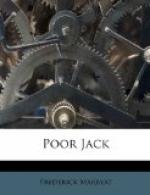I drew nearer, that I might not lose a word of what Turner said; and then he narrated, in the following words,
THE LOSS OF THE “ROYAL GEORGE”
“Well, messmates, the ‘Royal George’ was a hundred-gun ship; and what we don’t often see now, when I first belonged to her her guns were all brass. We had brass twenty-four-pounders on our quarter-deck, forecastle, poop, and main deck, brass thirty-twos on our middle deck, and brass forty-two-pounders on our lower deck. In the spring of ’82, when we were at Plymouth (about six months before she sunk), it was considered that the brass forty-twos on the lower deck were too heavy for her, so they were put on shore, and we had iron thirty-twos instead. I don’t think, myself, it made much difference in the weight of metal, and we were sorry to part with them. We were a flagship, you know—old Kempenfelt carrying his blue at the mizzen—and our poop lanterns were so large that the men used to get inside them to clean them. She was rather a top-heavy sort of ship, in my opinion, her upper works were so high—why, we measured sixty-six feet from the keelson up to the taffrail; but still, with proper attention, there was nothing to fear on that score.
“Well, it was on the twenty-ninth of August, ’82—that’s just fourteen years and about six weeks ago—that we were lying at Spithead, in company with Lord Howe’s fleet of between twenty and thirty sail of the line: there was the ‘Victory,’ ‘Barfleur,’ ‘Ocean,’ and ‘Union,’ all three-deckers, I recollect, close to us. We were in good repair, not at all leaky, and were to have sailed in two days to join the fleet in the Mediterranean. We had been paid, in consequence of our being about to sail foreign; and we had been paid in golden guineas. I think that, could all the money be collected together, from the pockets of the seamen, the women, and the Jews, who went down in the ship, it would be a very pretty fortune even for a duke’s daughter.”
Here Ben shoved the ale to Turner, who drank a little and proceeded, while Ben took a swig and passed it round.
“Well, you see, messmates, the first lieutenant had been washing the decks on the morning before, and the carpenter had been ordered to let the water in, when it was found that the water-cock, which was about three feet below the water-line, was out of order, and it was necessary that it should be repaired. The foreman came off from the dockyard, and stated that it was necessary that the ship should be careened over to port sufficiently to raise the mouth of the pipe—which went through the ship’s timbers below—clean out of the water, that they might work at it; so, between seven and eight o’clock on that morning, the whole of the larboard guns were run out as far as they could be, and of course the larboard lower deck ports were open; the starboard guns were also run in amidships, and secured by the tackles; the shifting over of this great weight of metal brought the larboard lower deck port-cills just level with the water; the men were then able to get at the mouth of the pipe to the water-cock on the starboard side, as it was clean out of water, and for about an hour they were working away hard at it.




